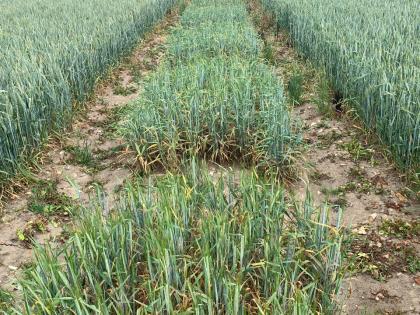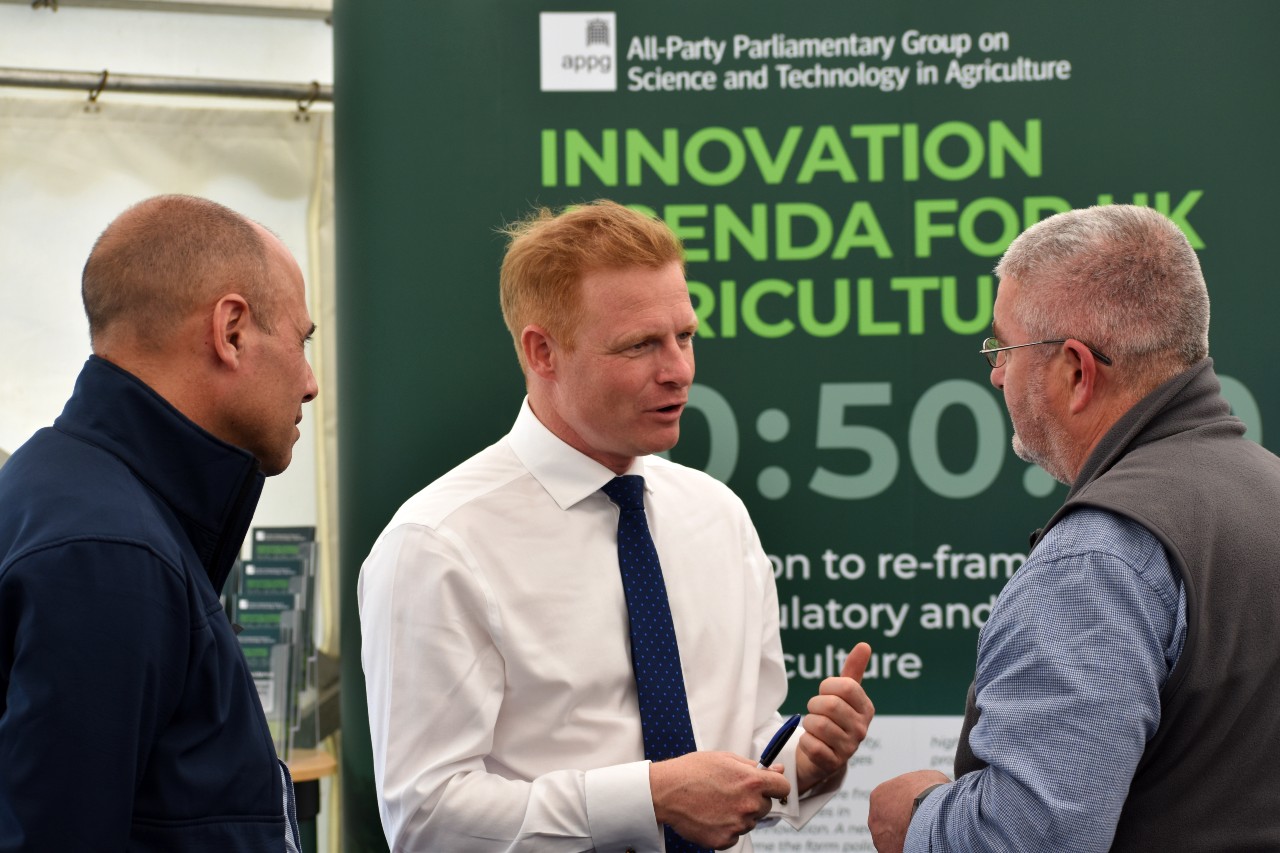- About
-
Research
- Agronomy and farming systems
-
Agricultural crop research
-
Research projects - agriculture
- About SASSA-SAI
- BioBoost
- Biomass Connect
- CTP for Sustainable Agricultural Innovation
- Climate Ready Beans - workshop presentations (March 2022)
- Crop diversity HPC cluster
- Final project workshop
- Get involved
- List of materials
- News and updates
- Partners
- The Sentinel Crop Disease Surveillance Network
- The research team
- UK Cereal Pathogen Virulence Survey
- UK wheat varieties pedigree
- Weed management - IWM Praise
- Crop breeding
- Crop characterisation
- Data sciences
- Genetics and pre-breeding
- Plant biotechnology
- Plant pathology and entomology
- Resources
-
Research projects - agriculture
- Horticultural crop research
- Crop Science Centre
- Research Projects
- Research Publications
-
Services
- Analytical Services
- Business Development
- Commercial trial services
- Membership
- Plant breeding
- Plant characterisation
- Seed certification
-
Training
-
Technical agronomy training
- Advanced crop management of bulb onions
- Advanced crop management of vegetable brassicas
- Advanced nutrient management for combinable crops
- Benefits of cover crops in arable systems
- Best practice agronomy for cereals and oilseed rape
- Developing a Successful Strategy for Spring Crops
- Disease Management and Control in Cereal Crops
- Incorporating SFI options into your rotation
- Protected Environment Horticulture – Best Practice
- Techniques for better pest management in combinable crops
- Crop inspector and seed certification
- Licensed seed sampling
-
Technical agronomy training
- News & Views
- Events
-
Knowledge Hub
- Alternative and break crops
-
Crop genetics
- POSTER: Diversity enriched wheat (2025)
- POSTER: Genetics of wheat flag leaf size (2024)
- POSTER: Wheat yield stability (2024)
- Poster: Traits for future cereal crops (2022)
- POSTER: wild wheat fragment lines (2022)
- POSTER: Improving phenotyping in crop research (2022)
- PRESENTATION: Plant breeding for regen ag
- Poster: Designing Future Wheat (2020)
- Crop nutrition
-
Crop protection
- POSTER: Understanding the hierarchy of black-grass control (2025)
- POSTER: Emerging weed threats (2025)
- POSTER: Disease control in barley (2025)
- Poster: Weed seed predation in regen-ag (2024)
- POSTER: Disease control in winter wheat (2025)
- POSTER: Mode of action (2023)
- POSTER: Inter-row cultivation for black-grass control (2022)
- POSTER: UKCPVS winter wheat yellow rust in spring 2025 (2025)
- Poster: Management of Italian ryegrass (2021)
- POSTER: UKCPVS winter wheat rusts - 2024/25 review (2025)
- POSTER: UKCPVS disease monitoring and the benefit to UK growers (2025)
- POSTER: Diagnosing and scoring crop disease using AI (2025)
- POSTER: Finding new sources of Septoria resistance (2024)
- POSTER: Fungicide resistance research (2024)
- POSTER: Detecting air-borne pathogens (2024)
- POSTER: Oilseed rape diseases (2024)
- POSTER: Fungicide resistance research (2024)
- POSTER: Improving chocolate spot resistance (2022)
- Poster: Pathogen diagnostics (2022)
- Fruit
- Regen-ag & sustainability
-
Seed certification
- POSTER: Wheat DUS (2024)
- POSTER: Innovation in variety testing (2024)
- POSTER: AI and molecular markers for soft fruit (2024)
- POSTER: Barley crop identification (2023)
- POSTER: Herbage grass crop identification (2023)
- POSTER: Herbage legume crop identification (2024)
- POSTER: Minor cereal crop inspecting (2023)
- POSTER: Pulse crop identification (2023)
- POSTER: Wheat crop identification (2023)
-
Soils and farming systems
- POSTER: Checking soil health - across space and time (2024)
- POSTER: Checking soil health - step by step (2024)
- POSTERS: Changing soil management practices (2022)
- Poster: Monitoring natural enemies & pollinators (2021)
- POSTER: Soil structure and organic matter (2024)
- POSTER: Novel wheat genotypes for regen-ag (2024)
- Video: New Farming Systems project (2021)
- Video: Saxmundham Experimental Site (2021)
- POSTER: Impact of prolonged rainfall on soil structure (2024)
- POSTER: Soil & agronomic monitoring study (2024)
- POSTER: The impact of rotations & cultivations (2024)
- VIDEO: Great Soils; soil sampling guidelines (2020)
- Poster: Soil invertebrates within arable rotations (2024)
- VIDEO: Soil health assessment (2021)
- POSTER: Saxmundham - modern P management learnings
- POSTER: Saxmundham - 125 years of phosphorus management
- Poster: Soil phosphorus - availability, uptake and management (2025)
- POSTER: Morley long term experiments (2025)
- POSTER: Exploiting novel wheat genotypes for regen-ag (2025)
- Video: Saxmundham Experimental Site (2021)
- Varieties
Shaping the future of agriculture

Niab CEO Professor Mario Caccamo discusses how gene editing, a precision breeding tool, can help address the pressing challenges that agriculture faces:
Breeding new crop varieties remains a slow and laborious process. It can take years, sometimes decades, from the first cross to the commercial release of a new variety. Climate shocks, conflict, and shifting policy outpace genetic progress, leaving yields stagnating in key crops such as wheat.
At the same time, the UK faces the steady erosion of its agricultural base. In a recent report ‘UK food security; outlook to 2050’, published online by the policy platform Science for Sustainable Agriculture, former NFU and CLA chief economist Dr. Derrick Wilkinson highlighted the loss of 4.4%, or 771,000 ha, of farmland over the past 25 years.
Domestic food production has fallen in parallel, dropping to 65%, its lowest level in half a century. Even more concerning, the report warns that in a worst-case scenario, almost a quarter of the UK’s utilised agricultural area could be at risk.
Against this backdrop, the question is unavoidable: can faster adoption of new technologies help us accelerate solutions? Can we realistically aspire to strengthen domestic food production and reduce our dependence on imports?

Niab CEO Mario Caccamo meeting new Minister of State for Food Security and Rural Affairs Dame Angela Eagle DBE at an industry event in early October 2025. (Photo by Max MacGillivray)
The Niab Landmark Autumn 2025 Edition explores how gene editing, a powerful precision breeding tool, can help address these pressing challenges. At Niab, we are not only investing in biotechnology, but also supporting efforts to modernise the regulatory frameworks that govern its use.
Wilkinson’s analysis makes clear that much of the decline in food production has been exacerbated by overly restrictive regulation, which has delayed innovation and limited farmers’ options.
With proportionate, science-based regulation, precision breeding technologies such as gene editing can transform our ability to feed more people, more sustainably. They will be crucial to enabling farmers to raise yields while using fewer inputs, supporting both profitability and environmental goals.
Encouragingly, positive stories of gene editing research now emerge almost daily. Scientists are developing higher yielding crops with greater climate resilience, more durable pest and disease resistance, improved nutritional quality, and reduced environmental impact.
The combination of precision breeding with digital tools such as artificial intelligence promises to accelerate progress further by fast-tracking the identification of genes linked to key agricultural traits.
With tens of thousands of genes within each crop genome, the opportunities for innovation are immense.

Mario discussing the 30:50:50 initiative: with shadow Defra minister Robbie Moore MP and APPGSTA’s Daniel Pearsall. The initiative aims to increase UK agricultural productivity by 30% by 2050, while simultaneously reducing the environmental footprint of farming by 50% per unit of output.
Momentum is also building in the commercial sector. Fresh Del Monte has warned of a looming global banana shortage driven by climate change and fungal diseases such as Black Sigatoka and Tropical Race 4.
In response, the company plans to begin field testing TR4-resistant gene-edited banana lines. UK start-up Tropic Bioscience is pioneering similar approaches to boost productivity and resilience in novel gene edited banana varieties.
Meanwhile, confectionery giant Mars has partnered with gene editing firm Pairwise to protect the cacao crop from mounting threats posed by disease and climate variability.
The scale of global research is equally compelling. According to the EU Sage database, more than 1,000 peer-reviewed studies on gene editing in crops have now been published. These span 76 species and 58 countries: this is a truly global phenomenon. The gene editing revolution is only just beginning, and with it comes the chance to address some of the greatest threats to our food supply.
The application of AI to unlock novel gene combinations will only accelerate this transformation. Britain’s scientists are at the forefront of this revolution. Through the Genetic Technology (Precision Breeding) Act, which came into effect this November, we have established one of the most progressive regulatory systems in the world designed to move breakthroughs from lab to field more quickly.
At Niab, we are proud to pioneer the use of science and innovation to enhance productivity, with precision breeding as a prime example.
One example of the benefits of gene editing, highlighted in Autumn’s Landmark, is the PiperPlus programme: a collaboration between BioPotatoes and The Sainsbury Laboratory. This initiative has produced a cisgenic potato with durable resistance to late blight. PiperPlus potatoes have been trialled at Niab for several years. This precision-bred variety not only helps growers manage a devastating disease but also contributes to environmental protection by reducing the need for pesticides.
Niab is also actively involved in ensuring that the current process for registering and evaluating new varieties developed through precision breeding is fit for purpose. This is another example that underscores the value of our expertise in supporting and de-risking the adoption of new technologies.
As Wilkinson’s report makes clear, growing populations and rising pressure on farmland mean that the only way to strengthen food security is to use our land as wisely and productively as possible. That requires farming policies and regulations that are fit for purpose, grounded in evidence, and enabling of innovation, not restrictive of it.
The challenge is urgent. The tools are available. Now we must ensure the will and the policies are in place to seize this opportunity.
This article originally appeared in the Autumn 2025 edition of Niab’s Landmark magazine. Landmark features in-depth technical articles on all aspects of Niab crop research, comment and advice. You can sign up for free and get Landmark delivered to your door or inbox:





